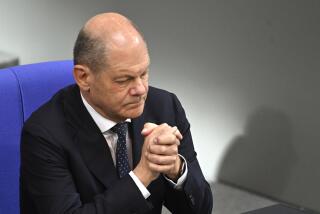Mark It Down as a Political Call
- Share via
In the last two weeks, the tide of refugees flowing East to West between the still-divided Germanys has ebbed, and somewhat calmer political waters now prevail. This is largely due to the decision of Chancellor Helmut Kohl’s government, facing an upcoming round of all-German elections, to overrule the Bundesbank--ever wary of inflation--and declare a very favorable rate for the future conversion of East German money into West German deutschemarks.
That decision leaves East Germans believing that they will profit from the likely monetary and political union with Bonn--and thus removes, for now, the motive for going West.
But this temporary political stability will have a price. Bankers in both West Germany and elsewhere in the West fear that the West-East mark conversion at the rate of one-to-one (up to a certain income level, after which the rate is lower) will prove costly indeed. An inflated German economy could shoot ripples westward and cause problems with other economies. How severe? Some say very: Kohl’s one-for-one will be achieved only over the Bundesbank’s bitter protests; Washington also has made its concerns known to Bonn.
No doubt monetary union will cause some inflation, but a disaster in the making? Not so, says the respected Financial Times of London, which in a recent editorial calculated that the West German economy--loaded with solid deutschemarks and other currencies--will take the hard edge off the acquisition and redemption of so many weak and wobbly ostmarks.
And the cost to Europe of an uncertain and even volatile German unification process would be astronomical. The very fact of a subsiding refugee tide is evidence that Kohl may have found the key to a proper way for the two Germanys to proceed apace.
More to Read
Sign up for Essential California
The most important California stories and recommendations in your inbox every morning.
You may occasionally receive promotional content from the Los Angeles Times.













